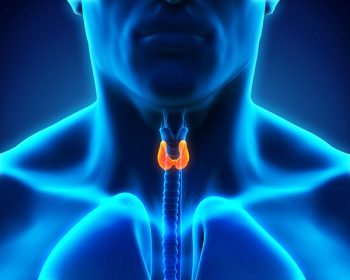The thyroid is a small butterfly shaped gland that sits in the lower neck. It is part of the endocrine (hormone) system. It is responsible for producing the hormones Thyroxine (T4), triiodothyronine (T3), and calcitonin. It is estimated that 20 million people have some form of thyroid dysfunction. There are receptors for thyroid hormone on every cell of the body therefore thyroid dysfunction can have far reaching effects.
Thyroid hormone when it reaches the cell acts as a spark plug for the cell. By igniting and stimulating the metabolism of the cell, thyroid hormone is crucial to producing energy, burning fat, staying warm, and a host of other functions. When it comes to thyroid dysfunction a patient can have a hypo-thyroid (underactive) or a hyper-thyroid (overactive) condition. Many patients may show signs of both, however over time most patients suffer from a hypo-thyroid condition. If they are hypothyroid they will show the following symptoms:
Fatigue
Weight Gain
Morning Headaches
Depression
Constipation
Cold Intolerance
Poor Circulation
High Cholesterol
Difficulty Fighting Infections
Slow Wound Healing
Chronic Digestive Problems
Dry Skin
Hair Loss
Swelling of Face
Low Body Temp
Loss of lateral 1/3 of eyebrow
Production of thyroid hormone begins at the hypothalamus. The hypothalamus is an area of the brain that is constantly tasting the blood. It is like an experienced chef that will then tell the body that we need a dash of this or a pinch of that. When it senses that the thyroid hormone levels are low the hypothalamus will release TRH (thyrotropin releasing hormone) which then tells the pituitary gland to release TSH (thyrotropin stimulating hormone). TSH then travels to the thyroid gland and this will cause production of T4 and T3.
The thyroid produces both T4 and T3, however, it is T3 which is the active form of thyroid hormone. Of the thyroid hormone produce by the thyroid, only 7% of it is T3, the rest is T4. The remaining T4 must then be converted to T3 in either the liver (primarily), kidney, gut, or the peripheral tissues.
The Problem with only Measuring TSH
TSH is considered the gold standard for measuring thyroid function. Unfortunately, TSH isn’t even a product of the thyroid itself. If you are diagnosing a thyroid dysfunction you should not use TSH alone as the indicator for thyroid health. For example, a patient may show signs of hypothyroidism, however, a blood test will indicate a normal TSH level. Often there is a disorder in the conversion of T4 to T3. If there is a dysfunction in the conversion, then T4 will remain high and the body will not increase TSH levels but the patient still shows all of the telltale signs of hypothyroidism because they have a low T3 level. This is often the case when someone takes Synthroid or some other form of thyroid replacement hormone. By taking the medication they are able to normalize the TSH level, yet, they still will have many symptoms of hypothyroidism.
Other lab tests that should be considered when diagnosing thyroid dysfunction.
- T4 Measurements – Free Thyroxine Index, Total Thyroxine, Free Thyroxine
- T3 Measurements – Resin T3 Uptake, Free T3, reverse T3
- Thyroid Binding Globulin
- Thyroid Antibodies – TPO ab, TGB ab
The Causes of Hypothyroidism
Unfortunately for most patients with a thyroid dysfunction, their thyroid is merely a symptom and not a cause. The #1 cause of hypothyroidism is an autoimmune disease called Hashimoto’s Thyroiditis. In Hashimoto’s disease, the immune system has begun to attack the thyroid thereby inhibiting production of thyroid hormone. Therefore, simply taking thyroid replacement hormone you are failing to address the true cause of your dysfunction. Ultimately you need to address your immune system. Often patients still need to take thyroid hormone replacement, because the condition has advanced to a point where they will always need some form of hormone replacement therapy.
I have entire section of my website dedicated to addressing immune problems because they are at the root of most chronic conditions. Immune dysfunction can be a complicated topic, however, it often comes down to addressing these 5 areas.
- Diet – consuming an anti-inflammatory diet with plenty of healthy fats is the first step towards regulating immune activity
- Dysbiosis (stealth infection, subclinical infection)
- Food Sensitivities – people with Hashimoto’s often have gluten sensitivity
- Toxic Load (Heavy Metals, Environmental Toxins)
- Chronic stress, Overtraining
Thyroid and Hormone Balance
No hormone operates in a vacuum, the entire endocrine system is an interacting orchestra and if you have an imbalance with one hormone it is very likely that there will another hormone imbalance. However, the first step in addressing any hormone dysfunction is to balance your blood sugar.
Blood sugar instability will wreak havoc on your pituitary, adrenals, and pancreas, not to mention every other cell in your body. Our bodies are wired so that the brain has a constant supply of energy, the energy comes from sugar and oxygen. Therefore, when blood sugar and oxygen levels drop this will sound off huge alarms, major stress responses are called into action, and the adrenals are called upon to release cortisol to raise blood sugar levels.
So, you may be thinking to yourself, “I guess I can eat sugar to insure that my blood sugar levels don’t drop.” Unfortunately, excessive carbohydrate consumption (especially refined) is the root cause of most blood sugar stability issues.
Because the fuel supply to the brain trumps all other activities, the body will sacrifice the production of other hormones in order to ensure production of Cortisol. Therefore production of Testosterone in males, Estrogen and especially Progesterone in females will be inhibited.
T4->T3 Conversion
An inability to adequately produce T3 is a very common problem among patients. This conversion occurs primarily in the liver, however it is often disrupted by excess cortisol, excess insulin, or excess estrogen.
If you can stabilize your blood sugar, excess cortisol and insulin will very often normalize. However, if your job is very stressful, you are pounding caffeine, or you are overtraining you may still be pumping out too much cortisol. For more information read the section on Adrenal Function.
Excess estrogen is often caused by a poor detoxification system. The liver and gut are not doing an efficient job of clearing estrogen from the body. This is another case were stable blood sugar levels are so important because one of the major estrogen detox pathways is dependent upon stable blood sugar.

